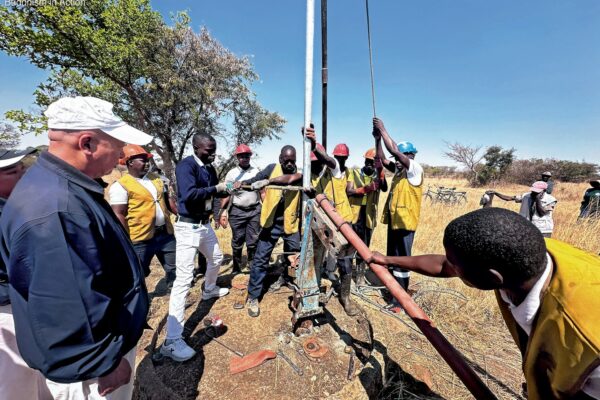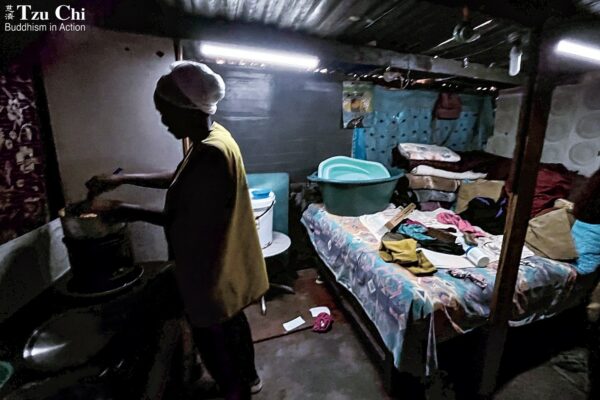By Ye Zi-hao
Edited and translated by Wu Hsiao-ting
Photos by Yan Lin-zhao
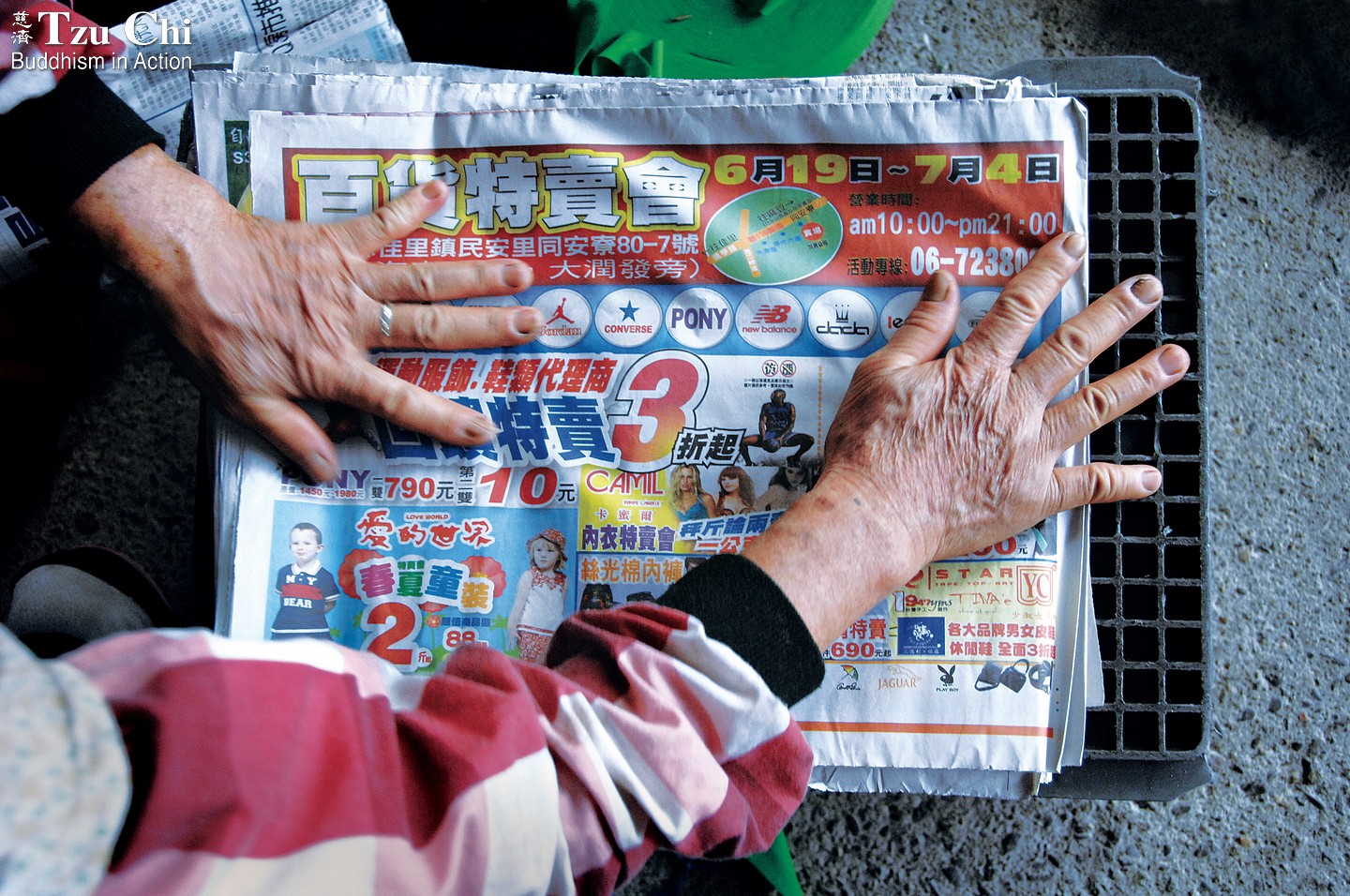
Taiwan has an impressive record for recycling. Without a doubt, Tzu Chi volunteers spread across more than 8,800 recycling stations and points in Taiwan have contributed to this success. When did the awakening of environmentalism start in Taiwan? How did Tzu Chi recycling volunteers help in transforming Taiwan from a “Garbage Island” into a global recycling leader?
The year 2020 is the 30th anniversary of Tzu Chi’s recycling work. It also marks the 50th anniversary of Earth Day. Because of COVID-19, however, many commemorative events or seminars have been cancelled or postponed.
During the first half of the year, the pandemic prevented hundreds of millions of people around the world from working or traveling, and factories and industries were forced to shut down. In fact, entire countries around the world were shut down to stem the spread of the disease. Though such measures negatively impacted worldwide economies, a positive side effect also emerged: fossil fuel emissions were greatly reduced. Mother nature was given a rare breather. Skies once hazy and grey became blue. Even India’s Ganges River witnessed a significant improvement in water quality.
This temporary improvement in environmental conditions was far from enough to make a lasting difference though. The degradation of the climate isn’t something that can be reversed so quickly. If it is to be improved, we all need to commit to taking action for the environment over the long term.
The European Parliament declared a climate emergency in November 2019. The Oxford Dictionary made “climate emergency” their word of the year for 2019 to remind people that our planet was in peril and immediate action is needed to save it.
Professor Ye Xin-cheng (葉欣誠) teaches at the Graduate Institute of Environmental Education at National Taiwan Normal University in Taipei. He pointed out that climate change is normalizing extreme weather events and that natural disasters in the next two or three decades will become more and more severe. He urged everyone to recognize the urgency of the situation and step up their efforts to reduce carbon emissions and make other adjustments.
Such warnings from experts prove that Master Cheng Yen’s concerns about the environment are well-founded. She has constantly reminded us that “time is running out,” that we must quicken our pace to safeguard our environment before it is too late. She has urged the international community to reach a consensus to save the planet from further degradation and then act together on that consensus.
Tzu Chi recycling volunteers have realized the urgent imperative for environmental protection and take Master Cheng Yen’s mission to protect the environment as their own. They lead a simple life, conserve water and electricity, and curb their consumption habits. They collect reusable garbage and sort it out at recycling stations for reuse, which reduces the need to extract new raw materials from the Earth. Well aware that we have only one Earth, they work together to cut down on pollution so that we can leave a better living environment for future generations.
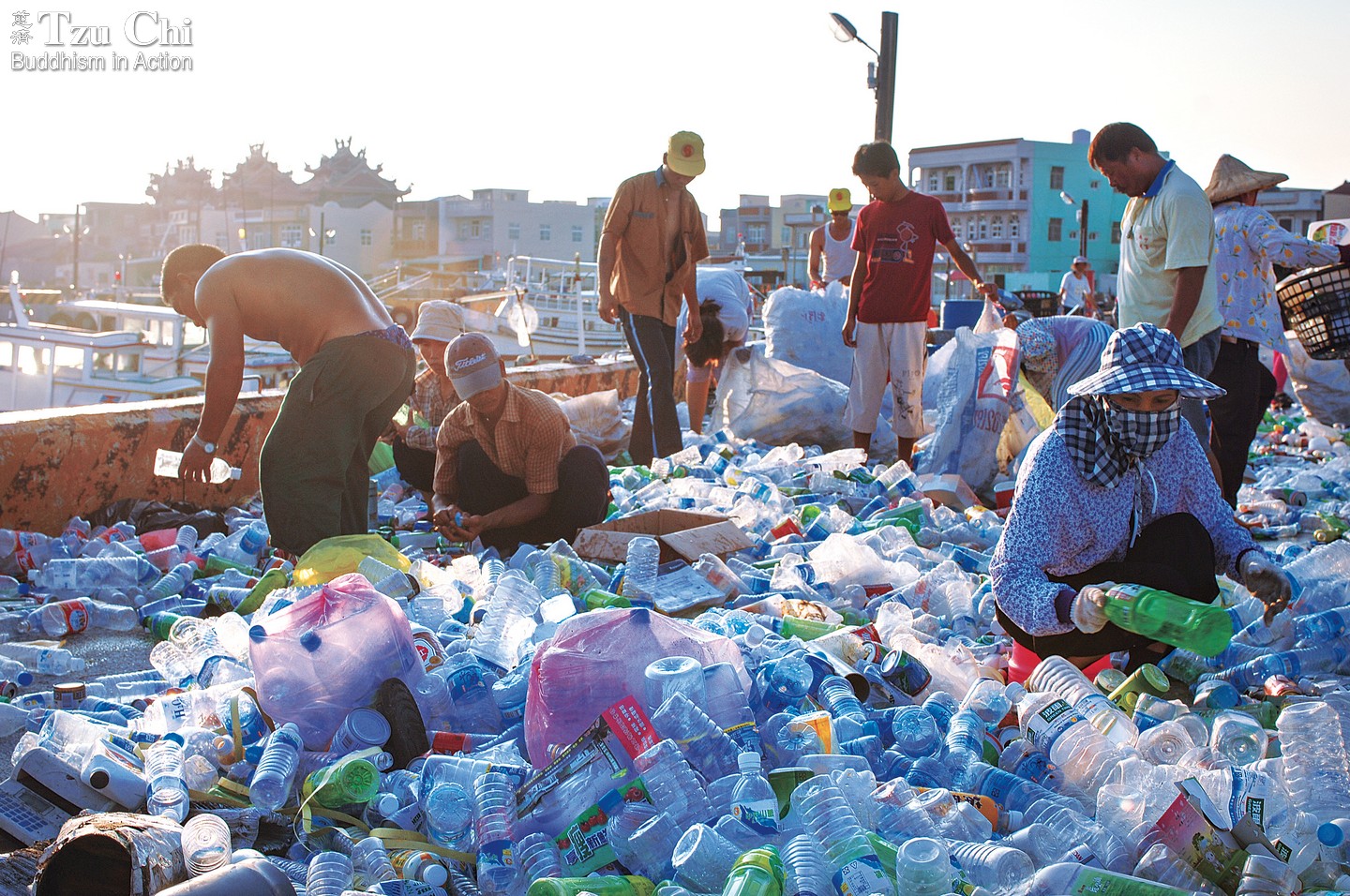
Recycling volunteers in Penghu, an archipelago off the southwestern coast of Taiwan, sort through a massive amount of plastic bottles for recycling.
Speak out for the planet
When it comes to environmental protection, many Tzu Chi volunteers think of Master Cheng Yen’s appeal for recycling 30 years ago, which launched the foundation’s recycling effort. But the environmental consciousness of some people was awakened much earlier than that, by more than 20 years.
American author Rachel Carson (1907-1964) published Silent Spring in 1962, a seminal work alerting the world to the dreadful effects of man-made chemicals on the natural world and ultimately, on humans themselves. As a whistleblower, Carson drew a ruthless assault from chemical companies, but her book eventually proved to be vastly influential.
The book sparked a grassroots environmental movement in the United States that helped lead to the first celebration of Earth Day in 1970, the establishment of the U.S. Environmental Protection Agency in the same year, and a ban on the domestic production of DDT in 1972. The reverberations of the book were such that it was lauded as altering the course of history.
Though Silent Spring was causing such an impact in the United States, environmental consciousness had not yet awakened in Taiwan. Neither the government nor private sectors knew enough about the importance of environmental protection to do anything about it. Taiwan’s economy took off in the 1960s and 70s, but the impressive economic growth came at a heavy price for the environment.
Many foreign manufacturers chose to set up factories in Taiwan during its early days of economic development. They were attracted to the island by its low labor costs and lax environmental regulations, which allowed foreign investors to save money on things such as waste treatment. But cutting corners like this inevitably resulted in an irremediable toll on the environment.
Pollution caused by Taiwanese people themselves was a serious problem too. The Erren River in Tainan, southern Taiwan, became one of Taiwan’s most heavily polluted waterways due to the industrial waste discharged into it by local scrap metal dealers. The banks of the Dahan River and the Tamsui River in northern Taiwan were littered with garbage.
Fortunately, as the standard of living improved in Taiwan following the growth of its economy, and as people became better educated and informed, Taiwan witnessed a surge in the environmental movement in the second half of the 1980s. Many campaigns against pollution and nuclear power were launched at this time, as well as for wildlife and ecosystem preservation. As a result, the Taiwanese government elevated the status of its environmental protection unit to a higher government level in 1987. Many regulations concerning the prevention of pollution were also amended in the late 1980s and early 90s, allowing stricter measures to be enforced to curb damage to the environment of Taiwan.
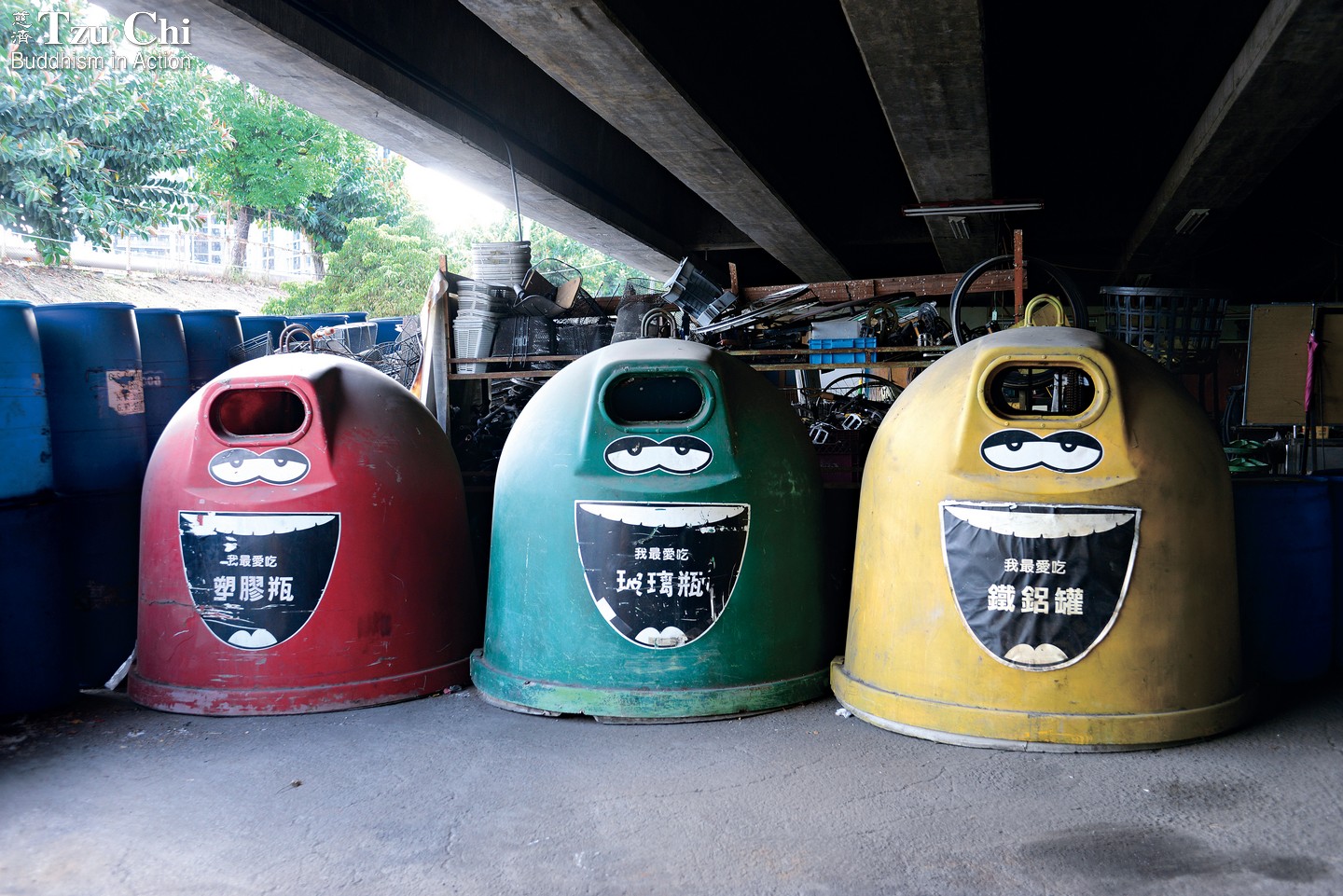
Recycling bins imported by Taiwan from the Netherlands in the 1980s. They were used briefly, only four short years, but they sowed a seed of environmental protection in the minds of Taiwanese people.
Use your applauding hands to do recycling
In addition to amending and making new laws to protect the environment, the government introduced policies and launched programs to ensure a cleaner Taiwan. Major programs were all given catchy names to better attract the public’s attention. The Environmental Protection Administration (EPA) also imported large recycling bins from Europe and taught people to separate their reusable garbage by type for recycling. But this recycling effort didn’t go well in the beginning.
Eugene You-hsin Chien (簡又新), who headed the EPA at the time, remembered that there was a big backlash to recycling in the beginning. Many people felt that their responsibility ended when they paid their taxes, and that it was the government’s duty to clean away and take care of their garbage. Such a backlash pushed the government to increase its focus on environmental education in schools. The government reasoned that a grand-scale transformation of how garbage was handled would be more accepted if the seeds of environmentalism were planted earlier in people’s lives. Around that same time, Tzu Chi volunteers, following Master Cheng Yen’s teachings, began taking up recycling work to help create a cleaner Taiwan.
On August 23, 1990, invited by the Wu Tsun-hsien Foundation of Culture, Education and Public Welfare, Master Cheng Yen gave a speech at a school in Taichung City, central Taiwan. That very morning, she had passed through streets in the city that were littered with garbage from a night market. The litter and messiness disconcerted her and prompted her to start calling on people to recycle.
In her address that evening, she told her audience that Taiwan was a very beautiful island and that if more efforts were expended to make it cleaner, it would only become more beautiful. She encouraged everyone to work with the government to sort out garbage and bring about a better environment. At the end of her talk, more than a thousand people in the audience broke into thunderous applause. Hearing that, she added, “Everyone, I really hope you use your applauding hands to sort out garbage.”
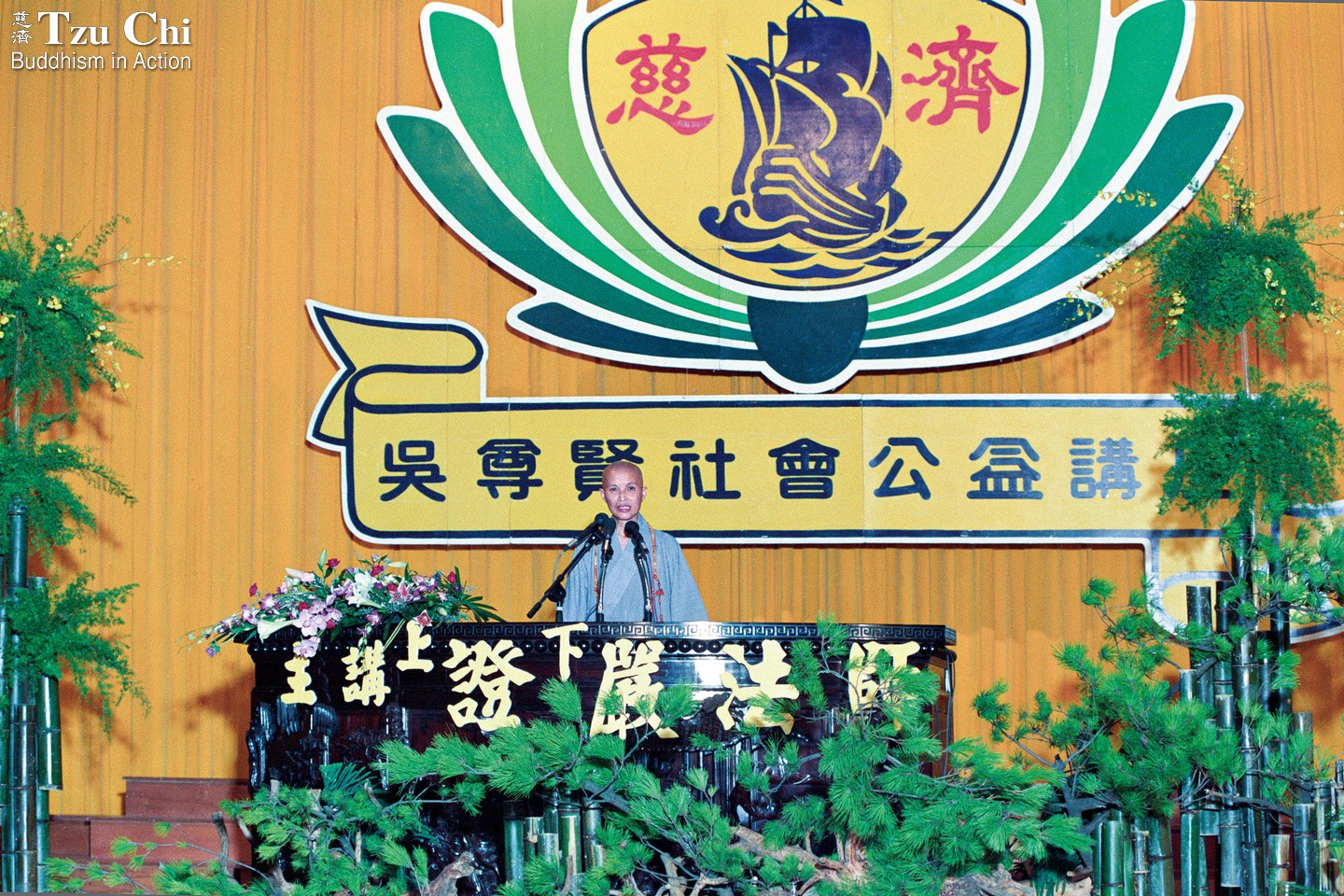
On August 23, 1990, Master Cheng Yen gives a speech in a school in Taichung, during which she calls upon the audience to use their applauding hands to do recycling. COURTESY OF TZU CHI HUALIEN HEADQUARTERS
Those in the audience included not only people from Taichung, but from other areas of Taiwan as well. Many were moved into action by the Master’s words and began recycling when they returned home. Yang Shun-ling (楊順苓), a resident of Fengyuan, Taichung, was one of them. She started by collecting newspapers and other recyclables from her neighbors.
About a month after Yang had started her recycling work, Master Cheng Yen visited Taichung again during one of her regular trips around Taiwan. Yang presented the money she had earned from her recycling efforts to the Master to donate to Tzu Chi. That was the first sum of money earned from recycling ever donated to the foundation. Though the amount was small, its significance was huge.
The Master praised Yang for taking up recycling, and for not minding the smell and filth of garbage. She said Yang had set a worthy example for everyone to follow. Many more took up recycling work too. Whether it was northern, central, southern, or eastern Taiwan, people collected recyclables and sorted them out in response to the Master’s appeal for recycling.
Jian Su-juan (簡素絹), a Tzu Chi volunteer, lived in Liming Community in Taichung. She set up a recycling point—the first Tzu Chi recycling point—in front of her home. Shi Shu-yin (施淑吟), a resident of Yuanlin, Changhua, central Taiwan, learned to drive a truck to transport recyclables. Even though the money she made from recycling wasn’t enough to cover the cost of fuel, she wasn’t discouraged, but kept going.
Chen Hui-min (陳蕙民) took up recycling after attending another one of Master Cheng Yen’s talks. At the end of 1990, the Master had given an address in the city that Chen lived in—Banciao, northern Taiwan. During that address, Chen heard the Master call upon her audience again to use their applauding hands to do recycling work. When the event ended, however, Chen was alarmed to see the trash cans at the venue spilling over with garbage. Scrap paper, plastic bags, and other garbage littered the ground around the trash cans. She wanted to help clean up and pick out the recyclables, but she was too embarrassed to do so.
As she was struggling with herself, something the Master said during her speech came to her mind: “We often treat ourselves too nicely.” Those words helped her overcome her embarrassment. She went to get a few large bags and, ignoring the smell and filth, began organizing the garbage by putting plastic bags, PET bottles, and metal cans into different bags. Her action inspired others to join her. Just like that, Chen embarked on her recycling road.
Preserve a Pure Land on Earth
Despite these examples, most people in Taiwan back then hadn’t yet formed the habit of recycling. Since environmental problems were created by people, it was essential to get everyone to recognize that the root of the problems lay with them and to inspire them to take action. To that end, Tzu Chi worked with the King Car Cultural and Educational Foundation in the early 1990s and started a campaign called “Preserve a Pure Land on Earth.” Part of the focus of the campaign was to promote environmental protection and motivate people to cherish and conserve the Earth’s resources. A series of activities including tree planting, recycling, talks, and concerts were held to raise people’s environmental awareness.
A paper recycling event was held as part of the campaign on April 19, 1992, three days before Earth Day. Eight counties and cities in Taiwan took part. In six hours, more than 160 metric tons (176 tons) of waste paper was collected across nine event venues. The proceeds from the sale of the paper went toward the construction fund for the Tzu Chi College of Medicine.
Sadly, efforts to conserve the environment can never seem to catch up with the speed with which it is deteriorating. A typhoon that pummeled Taiwan on July 31 and August 1 of 1996 sounded another environmental alarm for the island. Typhoon Herb triggered deadly landslides in Sanyi Township, Miaoli County, northern Taiwan, and all but destroyed a village in Xinyi Township, Nantou County, central Taiwan. It also caused severe flooding in Banciao and Xizhi in northern Taiwan.
After that disaster, the Master told her followers with a heavy heart that Taiwan was a small island and if we didn’t cherish it, “the topography of the island might be completely changed one day.”
Responding to the Master’s words, Common Wealth Magazine, one of Taiwan’s most influential periodicals, invited Tzu Chi, the Taipei City Government’s Department of Environmental Protection, the Industrial Technology Research Institute, and 14 other organizations to sponsor an event to clean up Taiwan. Hundreds of private organizations, including Tzu Chi, mobilized 50,000 people to participate. Among these were over 10,000 Tzu Chi volunteers. The participants, spread across 18 counties and cities around Taiwan, joined hands to clean up the island on October 20, 1996.
Seeing how hard everyone worked to clean up the environment, the Master encouraged Tzu Chi volunteers to step up their efforts to carry out and promote recycling in their various communities. Her repeated appeals for envwironmental protection helped lead the number of recycling stations and recycling volunteers to grow more and more numerous in Taiwan. Tzu Chi’s recycling effort eventually became the important environmental protection force that it is today.
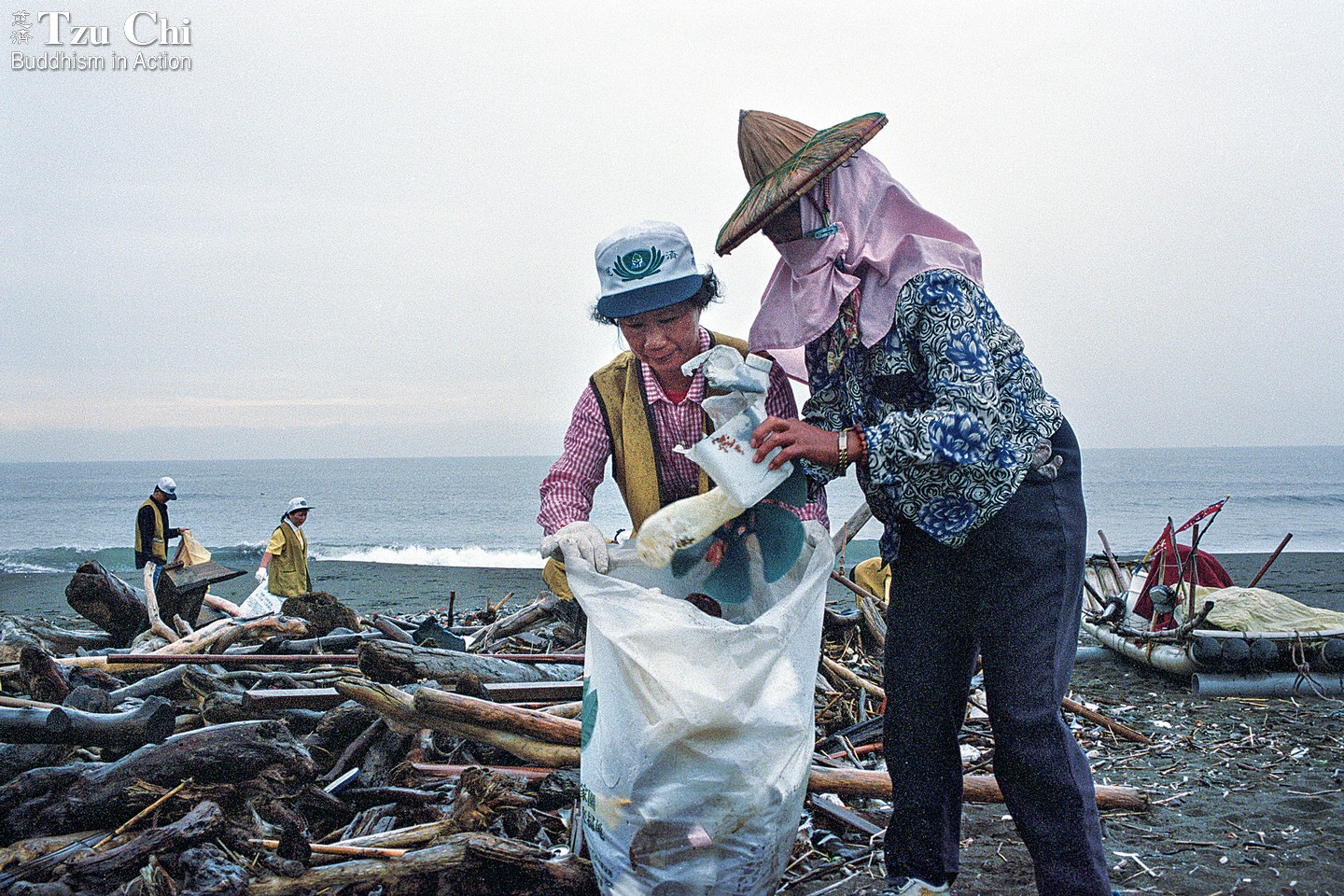
People recycle paper in an event that is part of the campaign “Preserve a Pure Land on Earth.” That campaign was launched by Tzu Chi and the King Car Cultural and Educational Foundation in the early 1990s. CHEN SHU-LING
Volunteers in Kaohsiung, southern Taiwan, take part in an island-wide cleanup event. The event was organized by Common Wealth Magazine after Typhoon Herb in 1996. CHEN YU-FANG
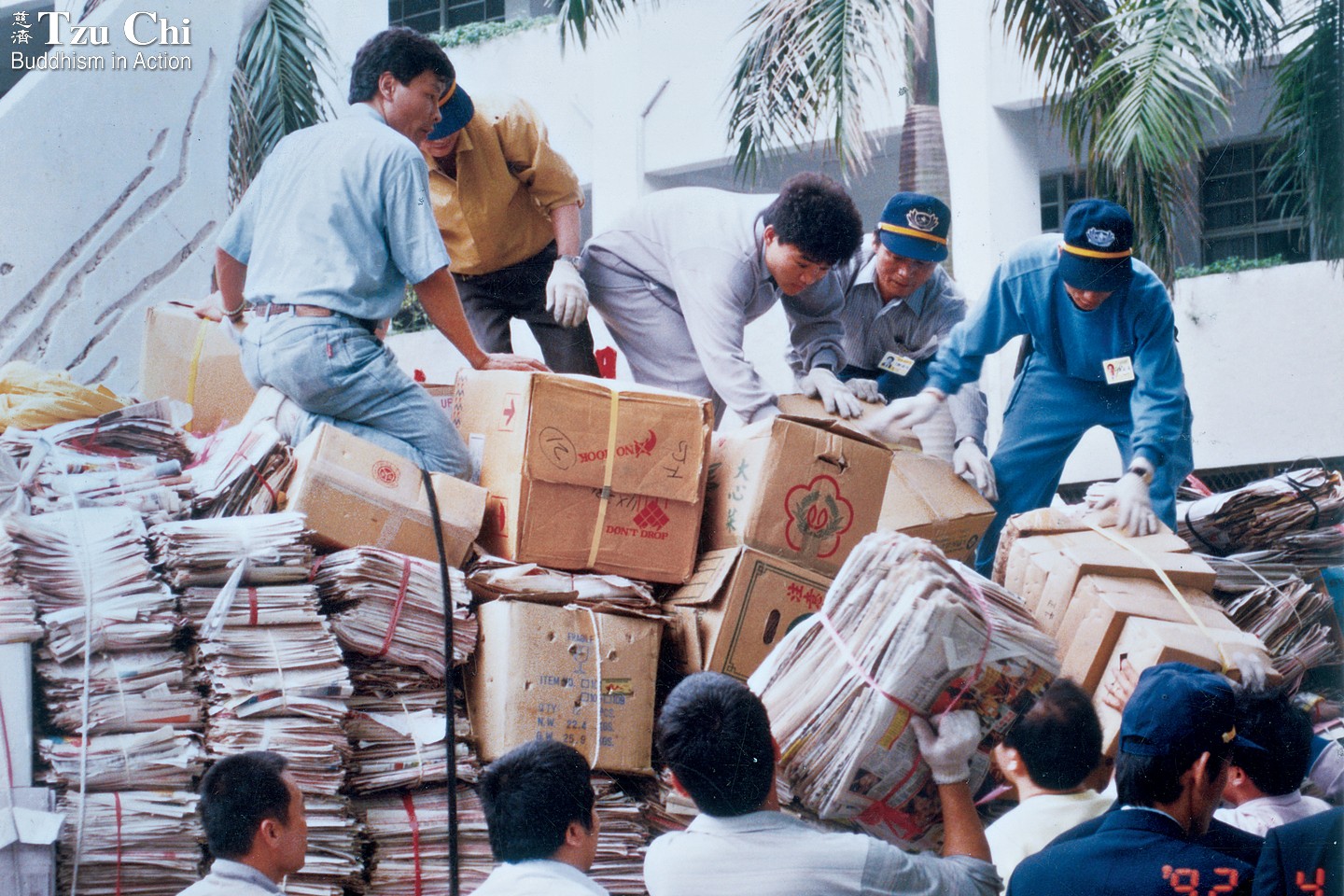
Making a difference
Taiwan became a lot cleaner with the government and private sectors’ combined efforts in promoting environmental conservation and recycling. According to statistics released by the EPA, the total amount of waste disposal in Taiwan in 1998 was 8,800,000 metric tons. That number decreased to 7,800,000 metric tons in 2000 and 5,000,000 in 2006. The amount of recycled garbage, on the other hand, increased nearly 17-fold, from 129,000 metric tons in 1998 to 2,188,000 metric tons in 2006!
The drastic reduction in garbage produced allowed the government to cut its planned construction of 36 incinerators down to 24. A major contributing factor to the commendable decrease in waste generation was a “four-in-one” resource recycling program that the EPA introduced in 1997. This program brings together community residents, local government garbage collection teams, recycling dealers, and a system of recycling funds to encourage the recycling and reuse of solid-waste resources. In this program, manufacturers and importers of merchandise such as motor vehicles, electronics, batteries, plastic containers, etc. have to pay a recycling fee to the EPA, which is then used to subsidize individuals and businesses that do the actual recycling.
While the monetary incentives have been effective in increasing the recycling rate in Taiwan, Tzu Chi volunteers aren’t financially rewarded for their work. But that doesn’t stop them from willingly taking up recycling. Many feel that the joy and happiness that comes from doing the Earth a good turn is enough reward for them.
“I usually left my house at four in the morning,” said Cai Kuan (蔡寬), a 101-year-old Tzu Chi volunteer. “Then I’d hop on a bicycle with a basket attached to the back seat for the garbage I was going to collect, and head toward the foot of Mount Bagua. When I arrived, I would start up the mountain on foot.” She was recalling her younger days when she used to pick up garbage while hiking Mount Bagua, in Changhua.
Onlookers that saw her working thought she was so impoverished she had to scavenge to make a living, but their sympathetic looks didn’t deter her. She continued no matter how she was perceived because she knew recycling was very meaningful work. She remembers those days fondly. Even though she is now over 100 years old, she still takes part in Tzu Chi’s recycling work. She says that engaging in recycling work has helped her stay fit and healthy and even worry less. Tens of thousands of recycling volunteers like Cai Kuan have helped Tzu Chi’s recycling effort to bloom.
In 2006, the Tzu Chi International Humani-tarian Aid Association began to use a process by which PET plastic could be recycled into fabric. Thus, the PET bottles sorted by Tzu Chi recycling volunteers could be converted into blankets for the needy. Production of the blankets was ramped up by the end of 2006, and they’ve been produced in large quantities ever since. Tzu Chi has distributed over a million such blankets to needy people around the world, including victims of Typhoon Haiyan in the Philippines, Syrian refugees, and even people in North and South America whose lives have been made difficult by COVID-19.
With global warming and climate change threatening the survival of humanity, countries all over the world need to increase their efforts to address environmental issues. Tzu Chi volunteers, without a doubt, will keep doing their part to help reduce greenhouse gas emissions and contribute to the sustainability of our planet. But more people need to act to ensure a better future. Our planet is at the crossroads. Its future depends on you and me.
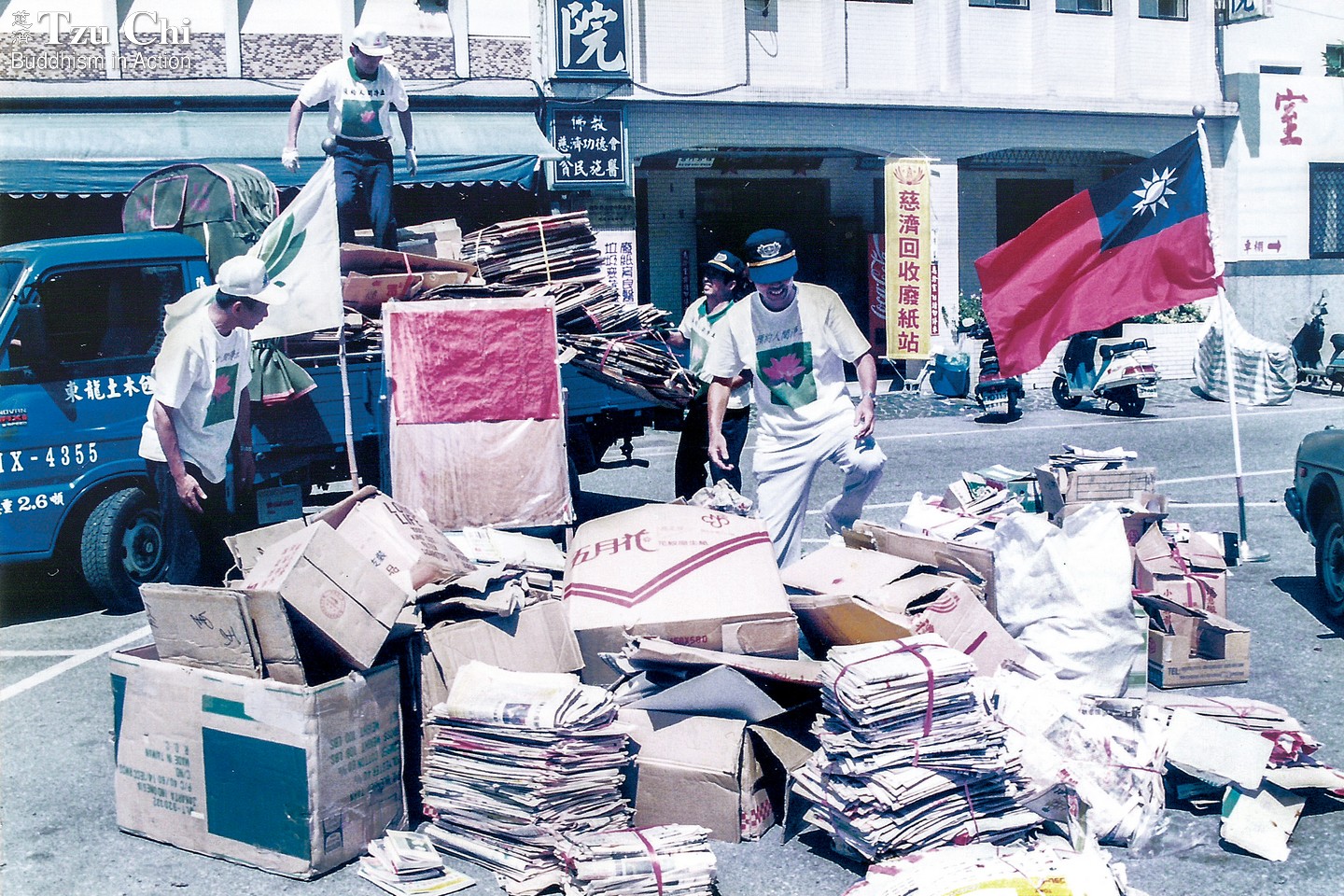
After the paper recycling event that was part of the “Preserve a Pure Land on Earth” campaign, Tzu Chi volunteers across Taiwan set up recycling points where people could bring their recyclables at fixed times. The recycling point pictured here was located at Hongde Hospital in Yuli Township, Hualien, eastern Taiwan. ZHANG CHENG-QI
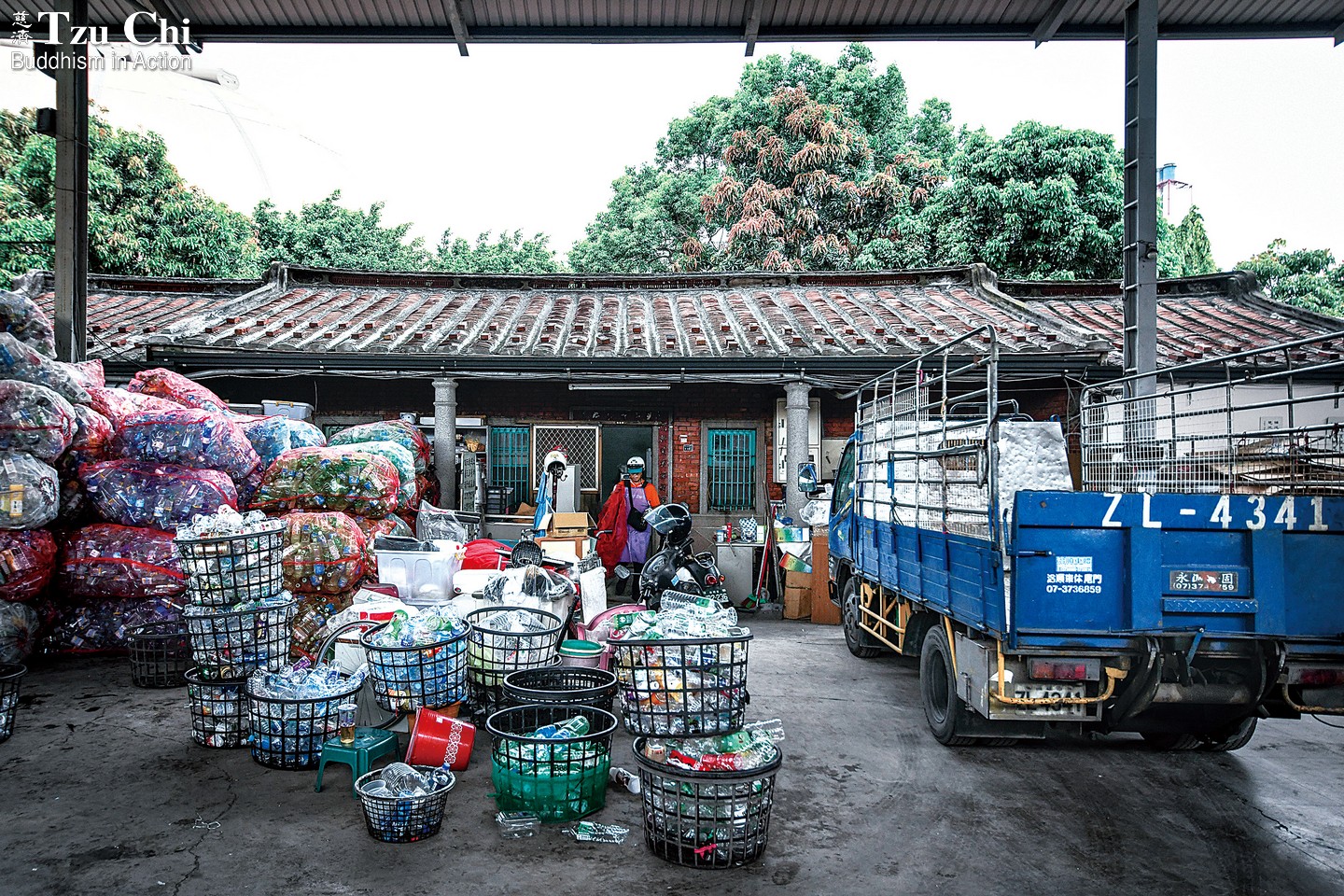
The Tzu Chi Bagualiao Recycling Station in Renwu District, Kaohsiung, in 1999. That year, students from National Sun Yat-sen University visited the station to learn how to sort and process recyclables. After that, many more organizations began visiting Tzu Chi recycling stations for the same purpose. This is how larger recycling stations gradually began providing environmental protection education to the public.
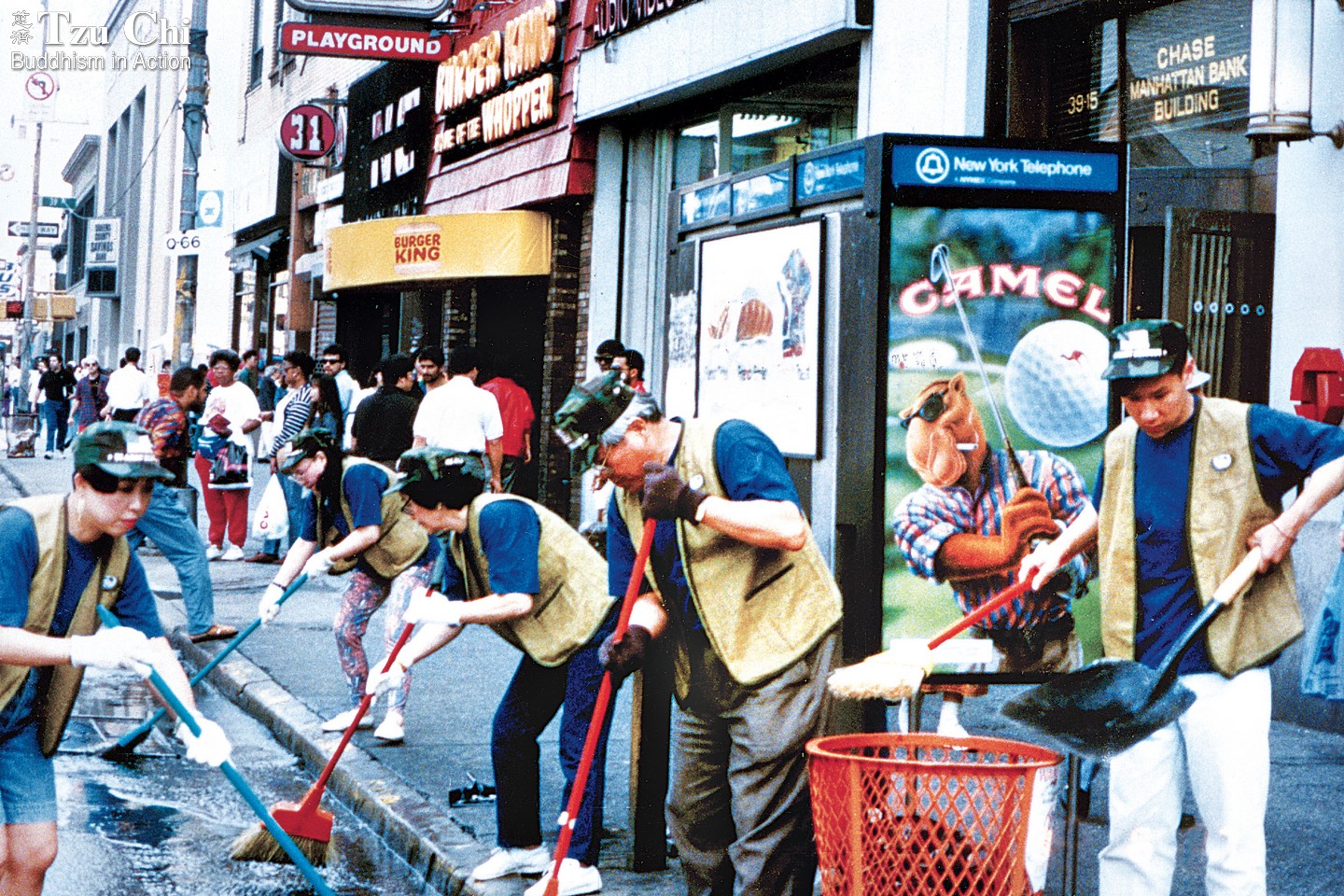
Tzu Chi environmental protection work expanded to places outside Taiwan in 1992. In June 1992, Tzu Chi volunteers in New York organized a street cleanup event in Flushing, where the Tzu Chi New York office is located. COURTESY OF TZU CHI NEW YORK OFFICE
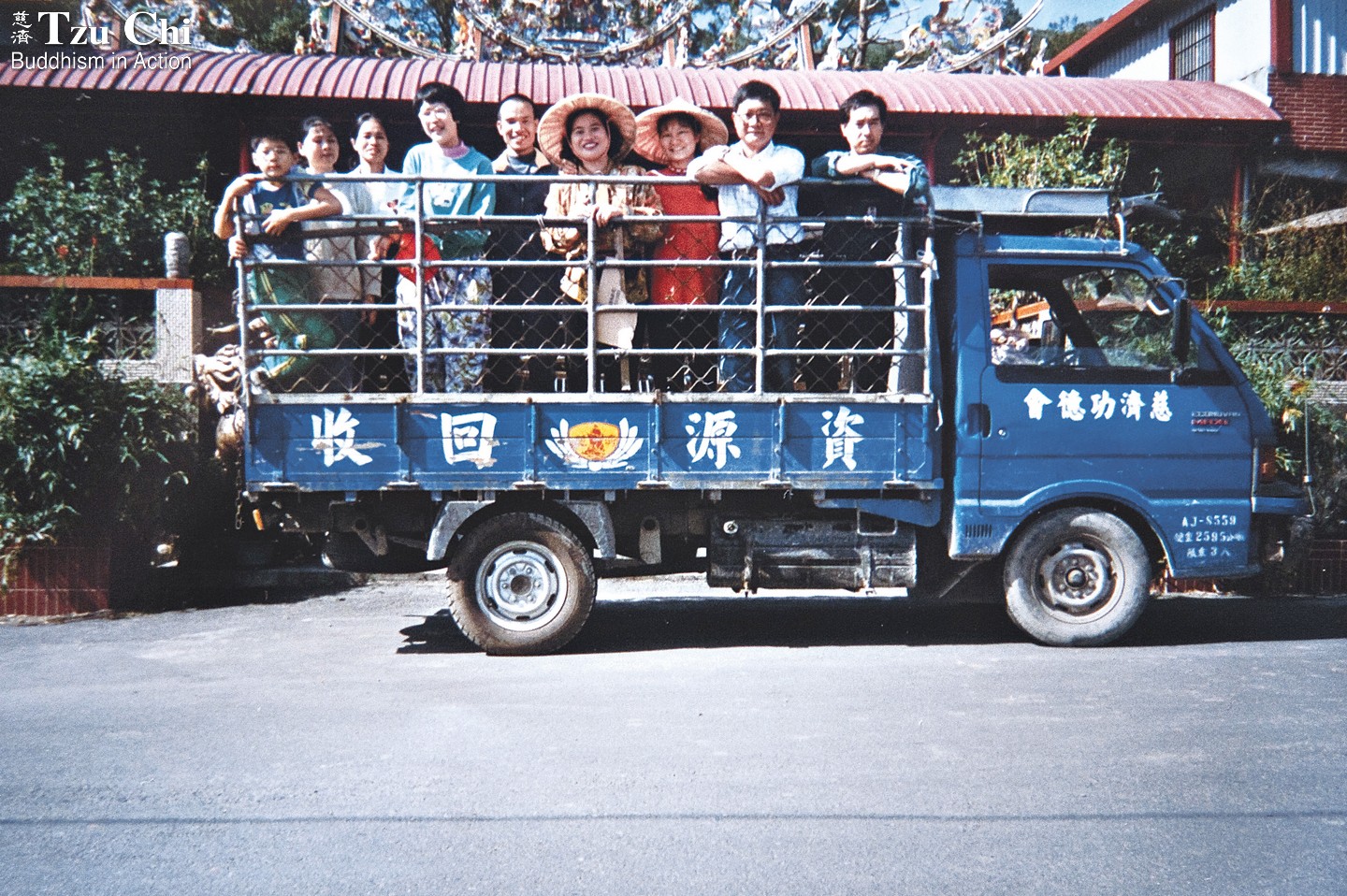
In 1991, Tzu Chi volunteer Chen Hui-min (third from right) bought a truck for more than 200,000 NT dollars (US$6,600) to be used as a vehicle to collect recyclable garbage. This became the first truck in the Greater Taipei Area to be dedicated to Tzu Chi’s recycling work. COURTESY OF CHEN HUI-MIN

